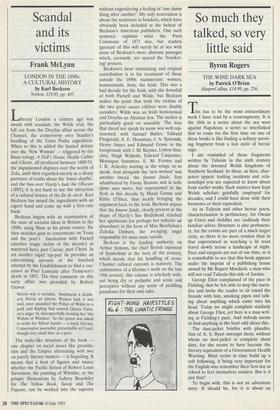Scandal and its victims
Frank McLynn
LONDON IN THE 1890s: A CULTURAL HISTORY by Karl Beckson Norton, f19.95, pp. 445 L'terary London a century ago was awash with scandals: the Wilde trial, the fall out from the Dreyfus affair across the Channel, the controversy over Stanley's handling of the Emin Pasha expedition. When to this is added the heated debate over the 'New Woman' — triggered by the Ibsen trilogy, A Doll's House, Hedda Gabler and Ghosts, all produced between 1889-91, the impassioned disputes over the worth of Zola, until then regarded merely as a sleazy purveyor of truths about the 'lower depths', and the fuss over Hardy's Jude the Obscure (1895), it is not hard to see the attraction of a cultural history of the fin de siecle. Karl Beckson has mixed the ingredients with an expert hand and come up with a first-rate book.
Beckson begins with an examination of the state of socialist ideas in Britain in the 1890s, using Shaw as his prime source. He then switches gear to concentrate on Yeats and the poet's fascination with Parnell (another tragic victim of the decade) as martyred hero, part Caesar, part Christ. In yet another rapid 'zip-pan' he provides an entertaining account of the botched attempt by the Establishment to find a suc- cessor as Poet Laureate after Tennyson's death in 1892. The best comment on this sorry affair was provided by Robert Graves:
Morris was a socialist, Swinbume a drunk- ard, Hardy an atheist, Watson had, it was said, once assaulted the Prince of Wales in a park and Kipling had earned Queen Victo- ria's anger by disrespectfully terming her 'the Widow of Windsor'. So the queen was asked to settle for Alfred Austin — a loyal, literary, Conservative journalist, presentable at Court, though very small beer as a poet.
The waltz-like structure of the book – one chapter on social issues like prostitu- tion and the Empire alternating with two on purely literary matters — is beguiling. It means that a host of figures and issues, whether the Pacific fiction of Robert Louis Stevenson, the painting of Whistler, or the priapic illustrations by Aubrey Beardsley for The Yellow Book, Savoy and The Pageant, can be worked into the tapestry without engendering a feeling of 'one damn thing after another'. My only reservation is about the sentences in brackets, which have obviously been included at the behest of Beckson's American publishers. One such sentence explains what the Paris Commune of 1871 was, but readers ignorant of this will surely be at sea with some of Beckson's more abstruse passages which, curiously, are spared the 'bracket- ing' process.
Beckson's most stimulating and original contribution is in his treatment of those outside the 1890s mainstream: women, homosexuals, Jews, the Irish. This was a bad decade for the Irish, with the downfall of both Parnell and Wilde, but Beckson makes the point that both the victims of the two great causes celebres were doubly outsiders: Wilde was an Irish homosexual and Dreyfus an Alsatian Jew. The author is particularly good on sexuality. The love that dared not speak its name was well rep- resented, with Samuel Butler, Edward Fitzgerald, A. E. Housman, J. A. Symonds, Henry James and Edmund Gosse in the foreground, with J. M. Keynes, Lytton Stra- chey, Hugh Walpole, Edward Carpenter, Montague Summers, E. M. Forster and J. R. Ackerley waiting in the wings, so to speak. And alongside the 'new woman' was another breed, the femme fatale, first adumbrated by Fanny Brawne and la belle dame sans merci, but represented in the flesh in this decade by Maud Gonne and Kittie O'Shea, thus neatly bringing the argument back to the Irish. Beckson argues that the femme fatale, clearly present in the shape of Hardy's Sue Bridehead, reached her apotheosis (or perhaps her reductio ad absurdum) in the form of Max Beerbohm's Zuleika Dobson, the avenging angel responsible for mass male suicide.
Beckson is the leading authority on Arthur Symons, the chief British exponent of Symbolism at the turn of the century, which means that his handling of cross- Channel cultural currents is masterly. The culmination of a lifetime's work on the late 19th century, this volume is scholarly with- out being dry or pedantic and acute and perceptive without any sense of peddling paradoxes for their own sake.


















































 Previous page
Previous page